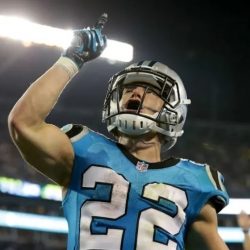
If HB929 is passed, North Carolina residents could fill out lineups with Cam Newton or Christian McAffrey on DraftKings or FanDuel.
North Carolina’s House of Representative passed a daily fantasy sports betting bill this past week. If House Bill 929 becomes law, season-long and daily fantasy sports will become legal in the state of North Carolina. HB 929 also creates a North Carolina Gaming Commission.
The question is whether lawmakers will pass this version of “fantasy sports betting” bill, as many North Carolina lawmakers call it. Previous attempts failed, though local media outlets believe the chances of passage are greater this time around.
Bill sponsor Rep. Harry Warren (R-Rowan) made his argument for a “Yes” vote in a recent House committee hearing. Rep. Warren said, “Fantasy sports has been going on in North Carolina for some time. It will continue to go on with or without this bill.”
“The question before you is, do you want it to continue unregulated, or under the direction of the North Carolina Gaming Commission?”
Why Regulated Fantasy Sports Makes Sense
The question is a perennial one in state houses and the US Congress. Those who support gaming regulation argue that bans on gambling do not stop gambling — they only drive the activity underground. Once it’s in the shadow economy, at-risk players gamble in an environment where they get no consumer protections, no problem gambling resources, and no arbitrator when the underground gaming site refuses to pay.
Meanwhile, a ban on gaming activities means the state collects no taxes on gambling. Also, when North Carolina gamblers play at online or mobile offshore gaming sites, their money might go to fund organized crime or other illegal activities.
Therefore, if North Carolina lawmakers pass such a bill, they can undermine organized crime and collect taxes that fund education in the state. They can impose consumer protections and require licensed sites to provide tools for problem gamblers. Those tools include hotlines and helplines for the gambler and their family members, counseling services for problem gamblers and their family, and a self-exclusion list to let the person opt out of gambling.
Why North Carolina Bans Fantasy Sports
Those arguments haven’t swayed lawmakers the past two years. In 2017 and 2018, proponents sponsored daily fantasy sports legalization bills. Each time, previous versions of HB 929 were voted down.
North Carolina lawmakers listened to anti-fantasy sports activists like John Rustin, the president of the North Carolina Family Policy Council. Rustin argues that daily fantasy sports is gambling — and a particularly dangerous form of gambling.
John Rustin recently spoke before a North Carolina House panel on the subject of fantasy sports. He said, “Online sports gambling, and sports wagering in general, is particularly addictive, especially among youth. This bill would bring with it a myriad of economic and social problems for individuals, families and communities all across our state.”
It’s an argument not often heard in other state capitals — that DFS targets youth gaming enthusiasts — but it worked in 2017 and 2018. Rep. Harry Warren thinks the argument won’t work again in 2019.
House Bill 929 Details
House Bill 929 would ban all fantasy sports gaming for North Carolina residents under the age of 18. No company employees for sites like DraftKings and FanDuel would be eligible for North Carolina daily fantasy sports contests — a reference to the Ethan Haskell scandal of 2015.
Daily fantasy sports companies would have to submit their revenue statistics for public auditing. Also, they would have to segregate operating funds from other company funds, so DFS players always could cash out winnings anytime they wanted.
Besides empowering a North Carolina Gaming Commission, HB 929 would give the commission authority professional boxing matches held in North Carolina. Also, it would give the Gaming Commission oversight over the North Carolina Education Lottery.
Sports Betting Bill
The daily fantasy sports bill might soon have a companion bill which legalizes traditional sports betting. The bill would give the land-based casinos owned by the Eastern Band of the Cherokee Indians in western North Carolina to operate sportsbooks on their reservations.
The bill would allow the Cherokee casinos to operate racebooks and simulcasting, essentially becoming off-track betting facilities. The sports betting lounges would host wagers on college and professional sports teams. Wagering on high school teams would be strictly forbidden.
